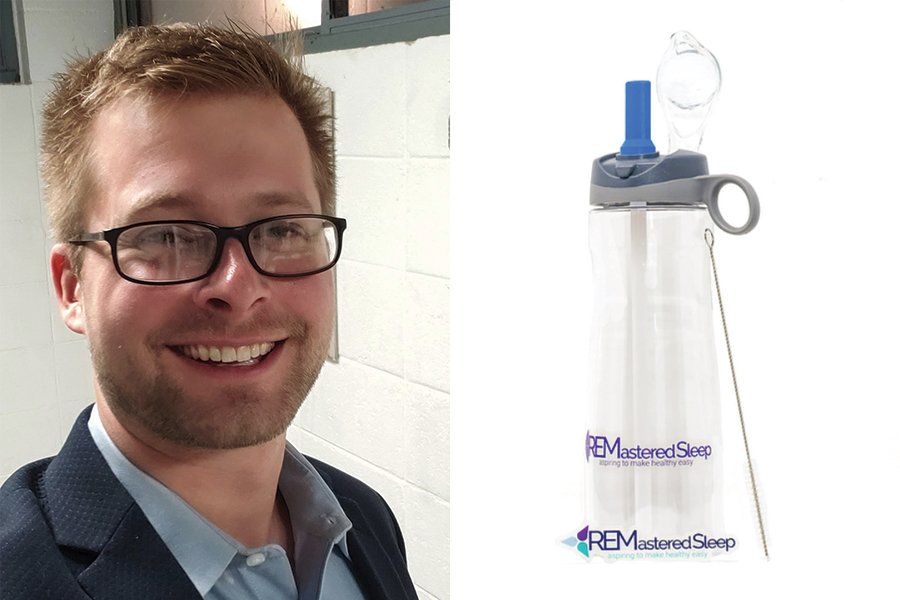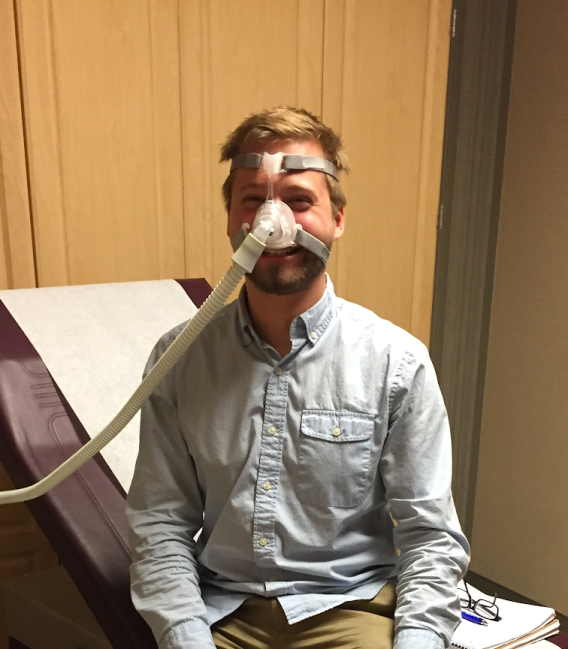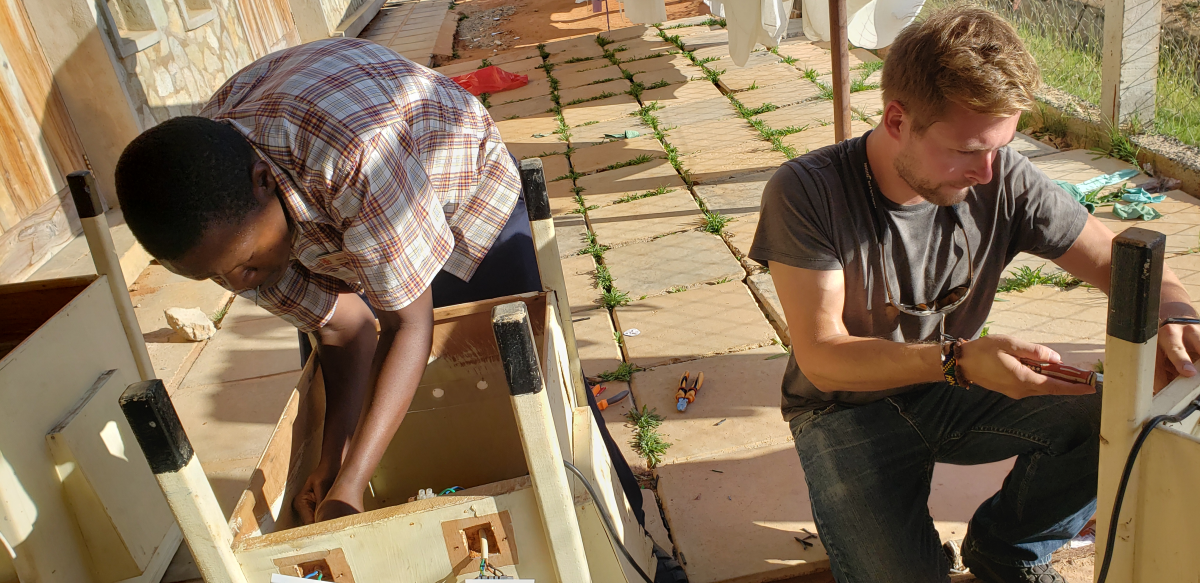TLI Graduate Discusses His Journey in Medical Device Innovation

Anders Olmanson has always been interested in studying sleep. After years of researching medical needs related to sleep, he created an effective solution for two of the most common problems: a water bottle that exercises mouth muscles to fight snoring and, hopefully in the future, obstructive sleep apnea.
Now running a startup for his product, his company REMastered Sleep just made it to the semifinals of MNCup, a competition that gives new businesses funding, mentorship, and exposure.
While his biomedical engineering degree from the University of Minnesota set him up with the background he needed, he credits his product success to his M.S. in Medical Device Innovation from the Technological Leadership Institute, where he was given the knowledge and resources to make his idea a reality.
In this Q&A, Olmanson discusses his time at TLI and his product, the REMplenish water bottle.
What first sparked your interest in biomedical engineering?
I've always been good at math and science, so I always knew I’d pursue engineering. My dad pushed me towards biomedical engineering and I started realizing that it meant learning how people are impacted by different health conditions and finding ways to improve people’s lives. It really resonated with me because I have family members with conditions who are being treated by different devices so I wanted to do my part to help other people. I have a long family history of doctors, so biomedical engineering was a great fusion of science and medicine for me.
What led you to the Technological Leadership Institute?
After my first two years of undergrad, I came across the M.S. in Medical Device Innovation at the Technological Leadership Institute and found it was exactly what I wanted to do. I started asking different colleagues and friends about the program and they all gave big thumbs up, they loved it. They said the curriculum has a lot of variety and I would get a lot out of it. I didn’t have the intention of going back to school, but after hearing about it, I knew I had to go for it.
Was there anything that surprised you about the MDI program?
The program surprised me by really changing my perspective. Before I did it, I was a happy engineer at Medtronic. I did the program and got this really high-level view of everything else going on and it completely changed my thought process. Before, I enjoyed being in the weeds on technical things. After the program, I saw how things fit into the overall medical device ecosystem. I jumped multiple levels in how I thought. That was really surprising and I realized while I liked doing the technical stuff, I wanted to make my own unique impact on solving health problems. It changed my interest and I also better understood myself. I did a lot of self-reflection to find what my strengths are and what I bring to the table.
How did your experience at the Technological Leadership Institute help you start a company?
The whole program really set me up to develop REMplenish. I learned how to find the needs first and come from a problem first approach to come up with a good solution. That was really important and I believe that’s how we came up with such a good solution. While we learned about startups, it’s something different when you’re actually doing it, so I’ve reached out to almost all of my professors at least once asking for advice. It's been really helpful because one day you're doing research and development, another day you're doing clinical research, another you're doing finances, sales, or marketing, so it’s a lot of different responsibilities all the time. You have to learn as you go so it's been really valuable having all those resources from TLI.
How did the need for REMplenish develop during your time in the MDI program?
The problem area came about through the MDI program during the clinical immersion portion. One reason we got into this area is because I’ve always been interested in sleep. We were at a sleep clinic watching a severe obstructive sleep apnea patient outright refuse continuous positive airway pressure therapy or CPAP therapy.

We dug into it more and we found out 80% percent of people are undiagnosed for obstructive sleep apnea, so a lot of people aren’t being diagnosed. Of the diagnosed, we found that there's 20% outright refusal of CPAP therapy, that's one in five. Then of the people that actually use it, it’s around 60% compliance. It’s the gold standard treatment. It works really well, but not many people are using it and getting benefits. That's where I got passionate about this space. After the MDI program, we started to figure out a solution for this problem and how to do it best with limited resources and pre-existing research on the issue.
What did you learn from traveling to Africa and Asia to research healthcare needs around the world?
When I realized I wanted to start my own company, I knew I needed to better understand what health problems are out there in the world. I also wanted to travel for a bit, so I merged the two and used it as an opportunity to challenge myself and study health needs around the world. I was leaving a stable job and it was such a huge decision at the time, but looking back at it now, it doesn’t seem so big and scary, more like a logical step in my journey.

I spent nine months traveling, mostly in Asia, going to a country per month, and then I spent one month in Africa at the end volunteering as a biomedical engineer at a hospital. It was a really great trip. I can't even explain how much I learned. I was meeting with different doctors, people in healthcare management, patients, and government workers. I really learned how to utilize my network. I also learned how similar and different each countries’ problems were. There are universal problems and then problems that are unique that come from differences in culture and constraints for that country, whether it's geography, cost, education levels, or even the equipment they have. I grew a lot and learned a lot about how the world works. Maybe I’ll write a book sometime.
What inspired the innovation of the REMplenish water bottle?
We were trying to think of how we can help people with obstructive sleep apnea when the majority of people do not get diagnosed. We decided to go after snoring because most people who have obstructive sleep apnea also snore. We came across a study where these people played the didgeridoo for 30 minutes a day and their obstructive sleep apnea and snoring got better. We dug into these other studies at the University of São Paulo in Brazil where they gave exercises that people would do to get the same results as the didgeridoo. For customer research, we asked people if they would spend 15 to 30 minutes exercising mouth muscles to help sleep apnea and some people said yes and others said no. So, we needed to find a way to deliver this in a way that people actually use it. That's where it was important that we didn’t just jump to solutions without truly understanding the problem. We could have just made a more portable didgeridoo, but that's not really the problem. The problem is that people don't want to take time out of their day to do these exercises.
Later, I was at my parent’s place and saw their dog eating peanut butter out of a Kong toy. I realized that the toy required effort by their tongue to get the peanut butter. I thought if there was a way that we could get people to give the same effort without realizing they're doing it, that would be perfect. Then I thought, what does everybody use? Everyone uses a water bottle and drinks water and that was the light bulb moment. The idea came to us, but it only did because we were understanding the space from multiple angles, talking to people, and knew the background, which is a really important aspect in developing a solution like this.
What makes REMplenish different and needed?
When compared to other snoring solutions, our product actually goes after the underlying conditions. It's targeting the muscles in your mouth and throat with exercise to tighten up the soft tissues to reduce the risk of vibration. Using a nose strip, chin strap or mouth guard helps address the symptoms, but it's not actually addressing what's happening underneath. Another huge advantage is you don't have to use it while you sleep and it naturally integrates into your daily routine. Just drink one or two bottles of water a day.
How long has the product been on the market and how has it been received?
We launched in December of 2020 and we've sold almost 900 units so far. It’s been well-received. Two-thirds of sales are direct-to-consumer through our website, then one third is through healthcare professionals like dentists, myofunctional therapists, speech therapists, occupational therapists, and physical therapists. We're getting some key opinion leaders who are excited about the product. We’re getting really nice reviews, it doesn't work for everyone, but for most people, it should help.
What’s your experience with MNCup been like?
I always knew about MNCup from the startup community in Minnesota and it's always been that competition that most startups below a million dollars strive to do. MNCup is a mixture of mentorship and learning. To get to the next stage, we need a ten-page business plan, a 15-slide deck and a one-minute video. It’s challenging us to do really well in each of those areas and really evaluate our business and understand how we tell a compelling story in all those different formats. We’re narrowing down the key things that we're doing as a business and it’s great having mentors to help guide us and give us feedback. We’re also utilizing the mentors to help improve our marketing strategy and crafting our video. The materials are being created for MNCup, but there will be a lot of value utilizing them outside of MN Cup. There are cash prizes for the finalists, which would be really helpful there so we're definitely trying to shoot for winning if we can.
What is next in both the MNCup and for REMasteredSleep?
We are trying to grow as fast as we can and get our product out there and establish ourselves in the market. We want to be the dominant player in this area, so we want to build up good health care professional networks. Also, just selling as much as we can. We think we have the best snoring solution on the market, so we want people to know that. For MNCup, the next deadline is in July and they make a final decision in September.
Is there anything else you’d like to share or would like people to know about you, your company, product, or experience with TLI?
I don't think I'd be on this path if I didn't do the master's program. It changed what I wanted to do and inspired me to travel and do the startup. It also gave me the information and connections to do what I wanted to do, so I'm very thankful and highly recommend the program to anyone who's passionate about innovation or just likes helping people with health problems. We need people to develop the next generation of health solutions. There are millions of health problems out there and we need people to solve them.
If you are interested in learning more about the MDI program at TLI, click here or join us for an upcoming information session.
Story by Kathryn Richner